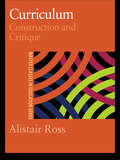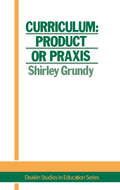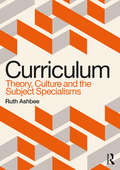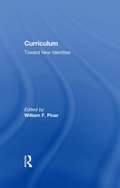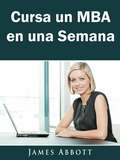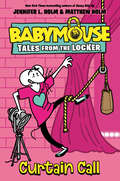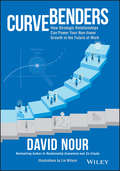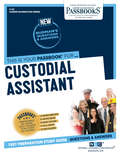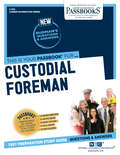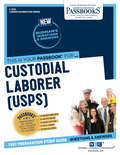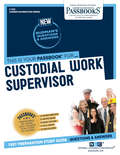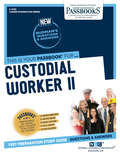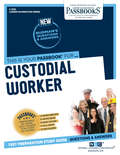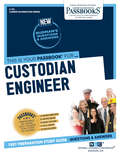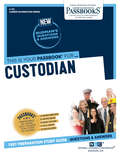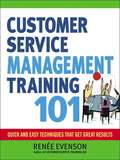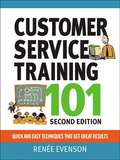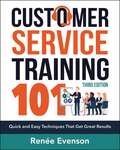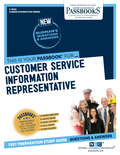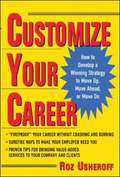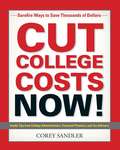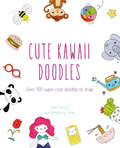- Table View
- List View
Curriculum: Construction And Critique
by Alistair Ross Prof Alistair RossAlthough curriculum is central to the schooling process, debates about it are rarely well informed. Over the past ten years there has been a dearth of books that have informed the debate by examining curriculum in a broader context, beyond the National Curriculum. Ross, in this refreshing re-examination of the area, opens up a more general debate on how the curriculum is shaped and the compromises made between different ideologies of the nature and purpose of education.
Curriculum: Product Or Praxis? (Deakin Studies In Education Ser. #Vol. 1)
by Shirley Grundy University of New England, USA.First published in 1987. Routledge is an imprint of Taylor & Francis, an informa company.
Curriculum: Theory, Culture and the Subject Specialisms
by Ruth AshbeeCurriculum, or the substance of what is taught, is the core business of schools, and yet little exists in the way of a theory of curriculum for educators. This book sets out the principles of curriculum theory and provides a common framework and practical strategies for the successful implementation and effective management of powerful knowledge-based curriculum for all. Offering powerful insights across the subject divides, the book explores the key elements of curriculum design including progression, sequencing, substantive and disciplinary knowledge, and the relationships of subjects to their sister disciplines. Providing a crucial foundation for school leadership, it covers: curriculum in the contexts of learning, organisational culture and key philosophical and moral ideas an explanation of thirteen specialist subjects, with outline mapping of the knowledge an emphasis on the cultural elements needed for sustained excellence in curriculum work within schools the codification of curriculum and the multiple values of documents for curriculum thinking and execution. Enabling leaders to analyse and discuss subjects beyond their specialisms, this essential text will equip readers to implement real change by leading intelligently and effectively on curriculum.
Curriculum: Toward New Identities (Critical Education Practice #17)
by William PinarThis collection of essays by established writers in postmodern pedagogy stakes out new conceptual territories, redefines the field, and presents a complete review of contemporary curriculum practice and theory in a single volumeDrawing upon contemporary research in political, feminist, theological, literary, and racial theory, this anthology reformulates the research methodologies of the discipline and creates a new paradigm for the study of curriculum into the next century. The contributors consider gender, identity, narrative and autobiography as vehicles for reviewing the current and future state of curriculum studies. Special FeaturesPresents new essays by established writers in postmodern pedagogy, Reviews curriculum studies through the filters of race, gender, identity, nattative, and autobiography, Offers in a single, affordable volume a complete review of contemporary curriculum practice and theory.
Cursa un MBA en una Semana
by Carolina La Rosa Montilla James AbbottPor ahora, muchos saben que los programas de MBA son demasiado caros y ofrecen pocos beneficios en comparación con su enorme costo. No solo son una pérdida de dinero, sino que también requieren de una gran inversión de tiempo. ¿Tienes la intención de cursar un programa de MBA pero no deseas pagar cientos de miles de dólares para obtenerla? ¿Buscas ahorrar tiempo obteniendo un "MBA de la vida real" en tan solo un par de semanas? ¿Está buscando obtener un "MBA de la vida real" desde la comodidad de su hogar, sin tener que abandonar el sofá? Si es así, entonces este libro es para ti. Algunos de los temas cubiertos son: •Mini programas de MBA •Cursos online •Los mejores programas •Cómo registrarse •Cómo empezar •Cursos gratuitos •Cómo prepararse para el éxito -> Desplázate hasta la parte superior de la página y haz clic en agregar al carro para comprar al instante Descargo de Responsablidad: Este autor y/o propietario (s) de derechos no hacen afirmaciones, promesas o garantías sobre la exactitud, integridad o adecuación de los contenidos de este libro, y expresamente renuncian a la responsabilidad por errores u omisiones en los contenidos. Este producto es solo para uso de referencia.
Curtain Call (Babymouse Tales from the Locker #4)
by Jennifer L. HolmWatch out, Broadway! Babymouse tries out for the school play in the next book in the Babymousetastic, highly illustrated Babymouse: Tales from the Locker series.All of middle school's a play--at least, it seems that way to Babymouse. So when she hears about auditions for the school play, she jumps at the chance. She knows she's destined to be the lead! Or the lead's best friend. Or...Clown #2? Babymouse scrambles to memorize her one line, work on set design, and try to wrap her head around stage directions. But when the big show has a major glitch, it will take all of Babymouse's newfound skills to save the play.Le exhausted sigh.
Curve Benders: How Strategic Relationships Can Power Your Non-linear Growth in the Future of Work
by David NourA personal growth roadmap guiding you into the future of relationships in work, life, play, and giving Curve Benders is a personal growth roadmap. It will guide you through the complicated intersection of work, life, play, and giving. Countless new forces will shape the future, so the strategic relationships we form in these areas of life are, of necessity, changing. This book will show you how to move into the future and dramatically alter your growth trajectory in both its direction and ultimate destination. David Nour, the author of Relationship Economics and a top thought leader on business relationships, has identified 15 forces that will heavily influence what we do and how and where we engage our current and prospective relationships to create value and make a difference in the lives of others. This book aims to provide you with a step-by-step guide for personal, professional, and organizational growth. The author highlights how certain relationships enable a non-linear growth trajectory. These relationships, in addition to augmenting what we can accomplish, often shape who we become. These relationships are “curve benders,” and this book will show you who and where they are, how to find and engage them, and, equally valuable, how you can become a curve bender to impact the lives and livelihoods of others profoundly. Gain insight into the value of your current strategic relationships and how they help you achieve your work, life, and giving goals Reconceptualize relationships to identify the people with the power, not only to help you achieve but to change who you become Learn how to become a “curve bender” who makes an outsized impact in the lives of others Become better at finding and engaging people, navigating the 15 forces that are reshaping our world This book is about strategic relationship planning, personal growth, and, ultimately, about you. Read Curve Benders to launch yourself into your best future.
Custodial Assistant: Passbooks Study Guide (Career Examination Series)
by National Learning CorporationThe Custodial Assistant Passbook® prepares you for your test by allowing you to take practice exams in the subjects you need to study. It provides hundreds of questions and answers in the areas that will likely be covered on your upcoming exam.
Custodial Foreman: Passbooks Study Guide (Career Examination Series #C-970)
by National Learning CorporationThe Custodial Foreman Passbook® prepares you for your test by allowing you to take practice exams in the subjects you need to study. It provides hundreds of questions and answers in the areas that will likely be covered on your upcoming exam.
Custodial Laborer: Passbooks Study Guide (Career Examination Series #C-3316)
by National Learning CorporationThe Custodial Laborer (USPS) Passbook® prepares you for your test by allowing you to take practice exams in the subjects you need to study. It provides hundreds of questions and answers in the areas that will likely be covered on your upcoming exam, including but not limited to: Following driections in prerformance of custodial duties; Building maintenance and related trades and General and mental abilities.
Custodial Work Supervisor: Passbooks Study Guide (Career Examination Series #C-1231)
by National Learning CorporationThe Custodial Work Supervisor Passbook® prepares you for your test by allowing you to take practice exams in the subjects you need to study. It provides hundreds of questions and answers in the areas that will likely be covered on your upcoming exam, including but not limited to: building cleaning; building operation and maintenance; ability to read and follow complex written instructions; supervision; and more.
Custodial Worker II: Passbooks Study Guide (Career Examination Series)
by National Learning CorporationThe Custodial Worker II Passbook® prepares you for your test by allowing you to take practice exams in the subjects you need to study. It provides hundreds of questions and answers in the areas that will likely be covered on your upcoming exam, including but not limited to: reading and following written instructions; building cleaning; supervision and training; and more.
Custodial Worker: Passbooks Study Guide (Career Examination Series #C-1230)
by National Learning CorporationThe Custodial Worker Passbook® prepares you for your test by allowing you to take practice exams in the subjects you need to study. It provides hundreds of questions and answers in the areas that will likely be covered on your upcoming exam, including but not limited to: building cleaning; keeping simple inventory records; ability to read and follow written instructions; use and care of equipment, materials and supplies; knowledge of cleaning chemicals; sanitation; and other related areas.
Custodian-Engineer: Passbooks Study Guide (Career Examination Series #C-36)
by National Learning CorporationThe Custodian-Engineer Passbook® prepares you for your test by allowing you to take practice exams in the subjects you need to study. It provides hundreds of questions and answers in the areas that will likely be covered on your upcoming exam.
Custodian: Passbooks Study Guide (Career Examination Series #C-175)
by National Learning CorporationThe Custodian Passbook® prepares you for your test by allowing you to take practice exams in the subjects you need to study. It provides hundreds of questions and answers in the areas that will likely be covered on your upcoming exam, including but not limited to: building cleaning; keeping simple inventory records; ability to read and follow written instructions; use and care of equipment, materials and supplies; knowledge of cleaning chemicals; sanitation; and other related areas.
Customer Service & Banking Codes and Standards
by Finance Indian Institute Of Bankingparamount importance. This is because, unlike other businesses which are sale oriented, banking is relationship oriented and hence, excellent customer service becomes the sine qua non as it provides the cutting edge for the successful functioning of a bank. For banks, it is important to not only attract customers but also to retain them and earn their continued goodwill/business/patronage.
Customer Service Management Training 101: Quick and Easy Techqniues That Get Great Results
by Renee EvensonBecoming a great customer service manager requires an intentional focus on skills beyond those required for exemplary customer service. Building off the success of her book Customer Service Management Training 101, author Renée Evenson shows readers what it takes to advance to the next stage in their careers--focusing on their development as managers. Filled with the same accessible, step-by-step guidance as its predecessor, this book teaches readers how to identify their personal management style and develop the core leadership qualities needed to communicate with, lead, train, motivate, and manage those employees responsible for customer satisfaction. Designed for new managers and veterans alike, Customer Service Management Training 101 covers essential topics, including: planning and goal setting, time management, team development, conflict resolution, providing feedback, listening to your employees, monitoring performance, conducting meetings, and managing challenges.Packed with checklists, practice lessons inspired by real-world scenarios, and detailed examples and explanations of the right and wrong ways to do things, this handy resource is the start and finish of everything customer service managers need to know to thrive.
Customer Service Training 101: Quick and Easy Techniques That Get Great Results
by Renée EvensonYour service team may represent the first, last, or only interaction point between your customers and your company. Your front-line service professionals make or break countless opportunities, leads, sales, and relationships every day. Completely revised and updated to meet the challenges of a new service landscape, the second edition of "Customer Service Training 101" presents proven techniques for creating unforgettable customer experiences. The book covers every aspect of face-to-face, phone, Internet, and self-service customer relations, and provides simple yet powerful tips for: projecting a positive attitude and making a great first impression; communicating effectively, both verbally and nonverbally; developing trust, establishing rapport, and making customers feel valued; and confidently handling difficult customers and situations. The new features include: 'How Do I Measure Up?' self-assessments, and 'Doing It Right' examples from the author's extensive customer service experience. Every step-by-step lesson in this comprehensive and inspiring training manual is augmented with instructive sidebars, a summary of key points, practice exercises, and so much more.
Customer Service Training 101: Quick and Easy Techniques that Get Great Results
by Renee EvensonThis invaluable resource is the training manual you need to give your employees the thorough training, review, and--if necessary--overhaul they need in the vitally important area of customer service.If their interactions with you and your employees were the only things your customers knew about your business, what would they say about it? Would they use descriptions such as &“uninformed,&” &“rude,&” &“hot-tempered,&” &“uncaring&”? For your customer, nothing else represents your business more than your employees; therefore, nothing is more important than arming them with the knowledge and skills they need to find the best solution for every customer. Using scenarios, guidelines, and practice exercises, Customer Service Training 101 will train them in:Creating positive first impressionsSpeaking and writing effectivelyListening attentivelyIdentifying needsMaking customers feel valuedConfidently handling customer complaintsYour business plan is sound. Your product is needed. Your growth strategies are ground-breaking, but poor customer service can bring it all to a crashing halt. Equip you and your employees with the necessary skills before it&’s too late.
Customer Service/Information Representative: Passbooks Study Guide (Career Examination Series)
by National Learning CorporationThe Customer Service/Information Representative Passbook® prepares you for your test by allowing you to take practice exams in the subjects you need to study. It provides hundreds of questions and answers in the areas that will likely be covered on your upcoming exam, including but not limited to: understanding and interpreting written information; interacting with the public; customer-service situations and practices; inductive reasoning; and other related areas.
Customize Your Career: How To Develop A Winning Strategy To Move Up, Move Ahead, Or Move On
by Roz Usheroff<p>Techniques and strategies for professionals to bolster their job security by becoming a more valuable employee <p>Today's smartest employees know that, to keep themselves from the "firing" line, they must constantly increase their value to their employers, customers, and clients. <i>Customize Your Career</i> presents readers with a twostep process for becoming an indispensable employee, by first defining one's personal mission and then using that mission as a blueprint to develop a professional success strategy. <p>High-profile career builder Roz Usheroff has made her name by showing business professionals how to discover and develop their own intellectual property, even in uncertain and insecure economic climates. Here, she provides solid, workplace-proven strategies designed to help anyone: <p> <li>Enhance interpersonal and communication skills <li>Become recognized as a leader and change-agent <li>Master the finer points of business protocol</li> </p>
Cut College Costs Now!
by Corey SandlerDrawing on insider advice from a roundtable of college administrators and financial planners, Cut College Costs NOW! shows you the best ways to manage spending, apply for financial aid, and increase your eligibility for federal, state, and private funding.
Cut College Costs Now!
by Corey SandlerDrawing on insider advice from a roundtable of college administrators and financial planners, Cut College Costs NOW! shows you the best ways to manage spending, apply for financial aid, and increase your eligibility for federal, state, and private funding. Also included is a line-by-line analysis of the two most important financial aid forms--the FAFSA application and the CSS/Profile. This comprehensive guide gives advance planning strategies for structuring finances before college application -- as well as how to restructure investments once the college bills start to arrive. Cut College Costs NOW! is the real deal on how to be a savvy college consumer. Corey Sandler is the author of the bestselling Performance Appraisal Phrasebook and has written more than 150 books on business and other topics.
Cut College Costs Now!: Surefire Ways to Save Thousands of Dollars
by Corey SandlerA Simon & Schuster eBook. Simon & Schuster has a great book for every reader.
Cute Kawaii Doodles
by Sarah AlbertoBursting with ideas for illustrators and those who have never sketched before, this inspirational book will teach you how to draw more than 100 adorable doodles and super-cute characters in just a few easy steps. Starting with a simple shape such as a circle or a square, Sarah Alberto - aka Doodles by Sarah - shows you how to transform these into a quirky plant, a cute donut, a characterful face, a dainty cloud, and much, much more.Annotated with quick tips and tricks to explain the process, the visual steps will show you how to create a whole host of charming characters, using the ubiquitous ballpoint pen. Why a ballpoint pen? It's universal, affordable, and versatile, and allows you to create small details and sharp lines. Sarah also demonstrates how you can also use coloured pencils or markers to add extra life to your completed doodles.With the author's engaging, sweet and simple style, you'll be instantly inspired to pick up a pen and some paper and doodle like you've never done before!
